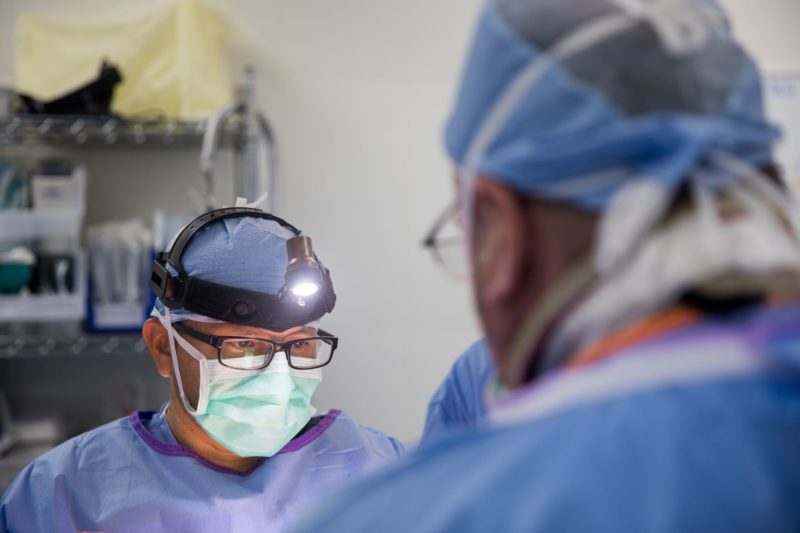A Model for Sustainable Surgical Centers in Low-Income Countries

One World Surgery, a nonprofit organization, breaks down common misconceptions around delivering surgical care globally
By Dr. Peter Daly | June 17, 2020
Five billion people around the world lack access to safe surgical care.
Despite this significant global burden, response to providing surgery in low- and middle-income countries is disproportionately under-addressed. The lack of prioritization of surgical care has led to many misconceptions around operating a successful surgery center in a low-income country. One World Surgery, a non-profit organization I helped co-found, is working to change these perceptions and demonstrate how responding to this immense need can be both effective and cost-efficient.
Misconception 1: Surgical care is too expensive to be sustainably scaled for low- and middle-income countries.
Evidence indicates that many surgical procedures are as cost-effective as many commonly prioritized global health interventions such as vaccinations, bed nets, oral rehydration therapy, and anti-retroviral medication. At One World Surgery, we decrease disability and change lives for little cost by focusing on the essentials needed to provide surgical care.
Specialists and other medical professionals cover their costs and donate their time during medical missions and surgical implants and equipment are donated, decreasing our overall costs significantly. Supplies are one of our largest expenses, making Medline an especially important partner. They strive to offer the most competitive pricing, alert us of similar products at lower costs and guide us towards more affordable reprocessed items.
Misconception 2: It would be better to only do medical missions instead of building a surgery center.
Pairing a free-standing surgery center with medical missions means that patients are cared for before and after the missions, assuring a continuity of care that is essential to favorable outcomes. In addition, utilizing both resources allows us to expand beyond the center’s local capacity to offer a range of surgeries of differing complexity and across multiple specialties. While the medical missions cover the majority of their own costs and by themselves would be less costly, it is only through partnership with our local team at the center that we are able to assure good patient outcomes in a way that is still considered very cost-effective by the World Health Organization standards.
Our medical missions not only benefit our patients, but also create an impactful service opportunity for individuals across the medical field as well as an international exchange of ideas and best practices with our local team. This includes both clinical and non-clinical opportunities. Each year since 2017, Medline engages in non-clinical missions to provide technical support in inventory management to improve our surgery center’s efficiency. They also invest in building capacity of the local healthcare system through education and training. Engagement like this not only builds a strong partnership, it sustainably equips local staff with more skills to care for patients.
Misconception 3: A surgery center in a low or middle income country is unable to provide the level of care found in ambulatory surgery centers in the United States.
Through our recent research study, we found that our patient satisfaction and post-operative complication and infection rates were similar, and in some areas, below those found in ambulatory surgery centers in the U.S. Our level of care continues to improve as well. By having a permanent center, U.S. physicians are consistently visiting our Honduran surgery center and providing further training and exchange of skills with our full-time Honduran physicians and staff, as well as the broader local medical community. Medline provides annual grant funding and ongoing training and mentorship for a local inventory manager as another key way to improve our center’s efficiency and supply chain.
Due to the impact and cost-efficiency of this model in Honduras, One World Surgery has made the prudent decision to expand to the Dominican Republic to respond to the country’s pressing medical needs. Medline has committed to supporting the development of the new center’s storage layout and inventory management system. Ultimately, we have worked to demonstrate that providing surgical care in low- and middle-income countries, like Honduras, can be cost-efficient, improve patient outcomes and provide care otherwise inaccessible to patients locally at the standard of U.S. ambulatory surgical centers. Medline is a major contributor towards achieving these outcomes.
Together, we are proving to the global health community that providing world-class surgical care to patients in need is necessary, cost-effective and possible.
Learn more about Medline’s partnerships in global health, and supply chain and perioperative solutions.
Dr. Peter Daly
co-founder and Chief Medical Officer of One World Surgery
Dr. Peter J. Daly, M.D. is the co-founder and Chief Medical Officer of One World Surgery. Dr. Daly is a sub-specialty board-certified sports medicine orthopedic surgeon specializing in shoulder, knee, and hip conditions. He is in a private orthopedic practice (Summit Orthopedics, St. Paul, MN) and is also a Clinical Assistant Professor at the University of Minnesota School of Medicine.

